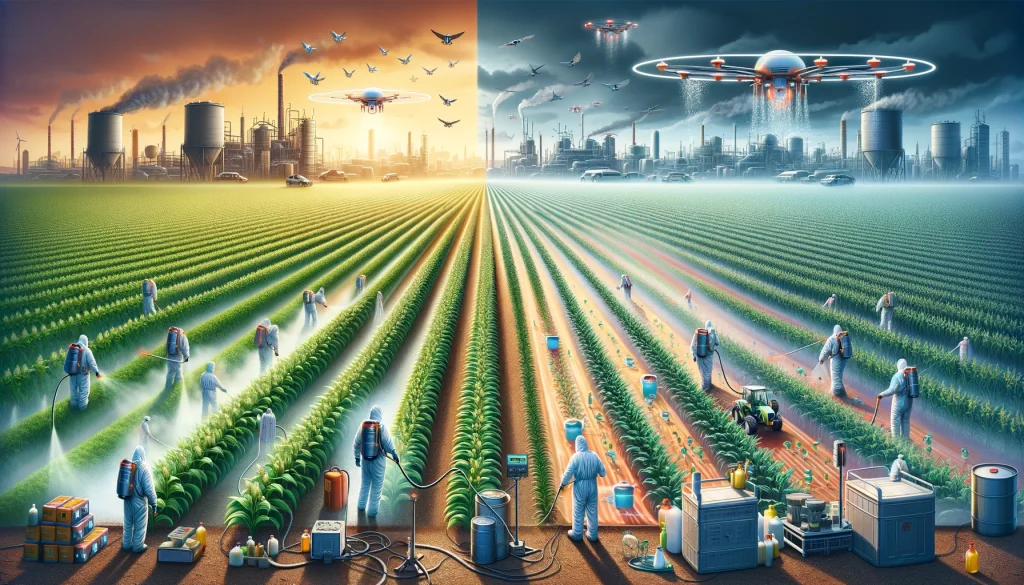As an Amazon Associate I earn from qualifying purchases.
In the quest for sustainable agriculture, the role of biotechnology emerges as a pivotal force in reducing the reliance on chemical pesticides. This innovative field offers a plethora of solutions aimed at enhancing crop resilience, combating pests, and addressing the environmental and health concerns associated with traditional pesticide use. As the global population continues to grow, the demand for food production intensifies, bringing the issue of pesticide overuse into sharp focus. The adverse effects of pesticides on human health, wildlife, and ecosystems have prompted scientists and researchers to explore alternative methods of pest control that are both effective and environmentally friendly. Biotechnology, with its ability to manipulate the genetic makeup of crops, presents a promising avenue towards achieving these goals. Through genetic engineering, the development of pest-resistant and disease-resistant crops, and the optimization of biological pest control methods, biotechnology has the potential to revolutionize agricultural practices. This article delves into how biotechnological innovations can lead to a significant decrease in pesticide usage, exploring the mechanisms behind genetically modified organisms (GMOs), the advancements in precision agriculture, and the future prospects of this cutting-edge approach to sustainable farming.
How Could Biotechnology Lead To a Decrease in the Use of Pesticides

Biotechnology has the potential to significantly reduce the use of pesticides in agriculture through the development and implementation of genetically modified organisms (GMOs) and other biotechnological innovations. These advancements can lead to crops that are inherently more resistant to pests and diseases, reducing the need for chemical pest control measures. Here are several ways in which biotechnology can contribute to decreasing pesticide usage:
1. Genetic Modification for Pest Resistance
- Biotechnology allows for the creation of genetically modified crops that possess natural resistance to specific pests. For example, Bt (Bacillus thuringiensis) crops produce a bacterial protein that is toxic to certain insects but safe for humans and other non-target organisms. This reduces the need for external applications of insecticides.
2. Disease Resistance
- Through genetic engineering, plants can be made resistant to various diseases caused by viruses, bacteria, and fungi. By enhancing the natural defense mechanisms of plants, biotechnology can decrease the reliance on fungicides and other pesticides used to combat these pathogens.
3. Herbicide Tolerance
- Biotechnology has led to the development of crops that are tolerant to specific herbicides, allowing farmers to use these herbicides to control weeds without harming the crop. While this technology primarily reduces the need for multiple types of herbicides, it can also indirectly reduce the need for other pesticides by promoting healthier crop growth and reducing stress on plants.
4. Enhanced Nutrient Utilization
- Crops can be genetically modified to utilize nutrients more efficiently, leading to stronger growth and reduced susceptibility to pests and diseases. Healthier plants are naturally more resistant to pests, which can decrease the need for chemical interventions.
5. Stress Tolerance
- Biotechnological advances can make plants more tolerant to environmental stresses such as drought, heat, and salinity. Stress-tolerant plants are generally healthier and more resilient to pest infestations, reducing the necessity for pesticide use.
6. Precision Agriculture
- While not a direct product of genetic modification, biotechnology tools and techniques can enable precision agriculture, where data-driven insights allow for the targeted application of pesticides only where needed, minimizing overall usage. This approach includes the use of drones, sensors, and AI to monitor crop health and pest pressures in real time.
7. Biological Control Agents
- Biotechnology research is also expanding the use of natural predators and parasites of pests, known as biological control agents. Through genetic engineering, these organisms can be made more effective and specific in targeting agricultural pests, providing an alternative to chemical pesticides.
Ethical and Environmental Considerations
- Despite the potential benefits, the use of biotechnology in agriculture, particularly GMOs, is subject to ethical, environmental, and health-related debates. Concerns include the potential for unintended harm to non-target species, the evolution of “superweeds” resistant to herbicides, and the socioeconomic impacts on farmers. Therefore, the development and deployment of biotechnological solutions must be carefully managed and regulated to ensure safety and sustainability.
In conclusion, biotechnology holds promise for reducing pesticide use in agriculture through the development of crops that are inherently more resistant to pests and diseases. However, realizing this potential requires careful consideration of the broader implications of such technologies on the environment, human health, and society.
Expert Tips
Biotechnology offers innovative solutions to reduce pesticide usage in agriculture, aiming for sustainability and environmental protection. Here are expert tips on leveraging biotechnology for this purpose:
1. Invest in Genetic Engineering Research
- Focus on Developing Pest-Resistant Varieties: Invest in research and development of genetically modified (GM) crops that have inherent resistance to pests and diseases. This includes enhancing natural plant defenses and introducing genes from other organisms that provide resistance.
- Prioritize Disease Resistance: Develop plants that are resistant to a wide range of diseases, reducing the need for fungicides and other chemical treatments.
2. Enhance Herbicide Tolerance
- Develop Selective Herbicide Tolerance: Create crops that tolerate specific herbicides, allowing for effective weed control without harming the crop. This approach should be managed carefully to prevent the development of herbicide-resistant weeds.
3. Promote Efficient Nutrient Use
- Engineer Crops for Better Nutrient Uptake: Develop crops that utilize nutrients more efficiently, leading to stronger, healthier plants that are less susceptible to pest attacks and diseases.
4. Improve Environmental Stress Tolerance
- Enhance Tolerance to Abiotic Stresses: Genetic modifications that enhance a plant’s tolerance to drought, salinity, and extreme temperatures can lead to more robust plants with reduced vulnerability to pests and diseases, indirectly reducing the need for pesticides.
5. Adopt Precision Agriculture Techniques
- Utilize Data-Driven Farming: Employ advanced technologies like drones, sensors, and AI analytics to monitor crop health and pest pressures precisely. This targeted approach allows for the application of pesticides only where necessary, significantly reducing overall usage.
6. Explore Biological Pest Control Options
- Develop and Deploy Biopesticides: Invest in research to discover and develop biopesticides that target specific pests without harming other organisms. Genetic engineering can enhance the efficacy and specificity of these biological control agents.
- Support the Use of Beneficial Organisms: Use biotechnology to boost the effectiveness of natural predators or parasites of pests as part of an integrated pest management strategy.
7. Foster Collaboration and Knowledge Sharing
- Encourage Multidisciplinary Collaboration: Foster partnerships between biotechnologists, agronomists, ecologists, and farmers to develop and implement biotechnological solutions effectively.
- Promote Education and Training: Ensure that farmers and agricultural professionals are educated about the benefits and proper use of biotechnological innovations to reduce pesticide use.
8. Ensure Regulatory Compliance and Safety
- Adhere to Regulatory Standards: Follow rigorous testing and regulatory approval processes to ensure that biotechnological innovations are safe for humans, animals, and the environment.
- Monitor and Manage Resistance Development: Implement strategies to prevent the development of resistance in pests and weeds to the new technologies.
By following these expert tips, the agricultural sector can harness the power of biotechnology to reduce dependence on chemical pesticides, leading to more sustainable and environmentally friendly farming practices. The key is to balance innovation with caution, ensuring that biotechnological advances benefit agriculture without compromising ecological integrity or public health.
Frequently Asked Questions (FAQ’s)
Expertise Questions and Answers on How Biotechnology Could Lead to a Decrease in the Use of Pesticides
Q: How does genetically modifying crops reduce the need for pesticides?
A: Genetically modifying crops can introduce traits that make plants inherently resistant to pests and diseases, eliminating or significantly reducing the need for chemical pesticides. For example, crops engineered to produce Bt toxin (from Bacillus thuringiensis) can resist insect attacks, thereby decreasing the reliance on external insecticide applications.
Q: What role does CRISPR technology play in reducing pesticide use?
A: CRISPR technology, a tool for precise genetic editing, allows scientists to enhance or introduce traits in plants with unprecedented accuracy. By editing the plant’s own DNA, traits for pest resistance, disease resistance, or improved nutrient use efficiency can be developed. This reduces the plant’s susceptibility to pests and diseases, consequently lowering the need for chemical pesticides.
Q: Can biotechnology improve the efficiency of biological pest control methods?
A: Yes, biotechnology can enhance biological pest control methods by making natural predators more effective or by engineering microorganisms to produce substances toxic to pests but harmless to other organisms. Through genetic modifications, these biological control agents can target specific pests more effectively, offering a sustainable alternative to chemical pesticides.
Q: Are there biotechnological solutions to combat herbicide-resistant weeds?
A: Biotechnology offers strategies to manage herbicide-resistant weeds by developing crops that enable the use of alternative herbicides with a lower risk of resistance development. Additionally, genetic engineering can be used to introduce traits that suppress weed growth directly or enhance the crop’s competitiveness, reducing weed pressure and the overall need for herbicides.
Q: How does biotechnology contribute to reducing pesticide runoff and environmental contamination?
A: By reducing the overall need for pesticides, biotechnology indirectly minimizes the risk of pesticide runoff and environmental contamination. Crops engineered for pest and disease resistance do not require frequent chemical applications, leading to less pesticide residue entering waterways and soil, thereby protecting ecosystems and biodiversity.
Q: What are the potential risks of using genetically modified organisms (GMOs) in agriculture?
A: While GMOs offer significant benefits in reducing pesticide use, concerns include the potential for gene flow to non-target species, unintended effects on non-target organisms (such as beneficial insects), and the development of resistance in pests. Rigorous risk assessments and monitoring are essential to address these concerns.
Q: How can precision agriculture technology complement biotechnological advances in reducing pesticide use?
A: Precision agriculture technology, such as drones and sensors, can be used in conjunction with biotechnological advances to monitor crop health and pest pressures in real-time. This allows for targeted interventions, applying pesticides only where and when needed, thus reducing overall usage. Biotechnology can further enhance precision agriculture by developing crops that are better suited to variable environmental conditions, further optimizing resource use.
Q: What is the future of biotechnology in sustainable pest management?
A: The future of biotechnology in sustainable pest management is promising, with ongoing research focused on developing new genetic modifications and biological control methods that offer effective, eco-friendly alternatives to chemical pesticides. Innovations such as gene drives for controlling pest populations, plants engineered to attract beneficial predators, and the use of natural plant defenses are on the horizon. The key to success will be integrating these technologies with traditional agricultural practices to create holistic, sustainable pest management strategies.
Conclusion
The intersection of biotechnology and sustainable agriculture heralds a new era in our approach to food production, offering viable solutions to the longstanding challenge of pesticide reliance. Through the lens of biotechnological advancements, we can envision a future where the use of harmful chemical pesticides is markedly reduced, if not altogether eliminated. The development of genetically modified crops that are inherently resistant to pests and diseases, the optimization of biological control methods, and the precision targeting of agricultural interventions are not just theoretical possibilities but practical realities being implemented across the globe. These innovations represent a significant stride towards minimizing the environmental footprint of agriculture, safeguarding biodiversity, and ensuring the health and safety of populations worldwide.
However, the journey towards fully integrating biotechnology into sustainable pest management practices is complex and requires careful navigation. It demands rigorous scientific research, ethical considerations, public engagement, and regulatory oversight to address potential risks and ensure that biotechnological solutions are accessible, equitable, and beneficial for all stakeholders involved.
As we move forward, the role of biotechnology in reducing pesticide use in agriculture underscores the importance of embracing interdisciplinary approaches, fostering innovation, and supporting policies that promote sustainable farming practices. By doing so, we can harness the potential of biotechnology to not only enhance agricultural productivity and food security but also protect our planet and its inhabitants for generations to come. The promise of biotechnology in leading the way to a decrease in pesticide use is a testament to the power of science and innovation in solving some of the most pressing challenges of our time, marking a pivotal step towards a more sustainable and healthier world.






